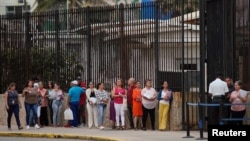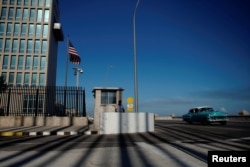The Trump administration's move to end five-year visitor visas for Cubans has left residents of the island angry and frustrated that it will be even harder to see their relatives, shop, or undertake cultural and academic exchanges in the United States.
The State Department on Friday said the measure, which became effective on Monday, was taken for reasons of reciprocity because Cuba currently issues only one-time temporary visas to visitors.
Tens of thousands of Cubans had used the five-year visitor visa to travel, often repeatedly, to the United States. They now can only get a visa that is valid for one trip during a three-month period.
Carlos Saladrigas, a Cuban-American businessman and head of the Cuban Study Group, which advocates engagement with Cuba, said ending the visa program was mean and counterproductive.
"It will cause great harm to Cuban civil society, the very sector driving changes to the island's political and economic structures," he said.
U.S. President Donald Trump has pledged to end the detente and engagement policy that was begun by the Obama administration in 2016 as part of its effort to end more than five decades of hostility between Washington and communist-run Cuba.
The U.S. embassy in Havana is operating with a skeleton crew because of an outbreak of mysterious health problems among its diplomats, and last year it shut down most councilor services, forcing Cubans to seek visas in third countries such as Mexico.
The Trump administration says the U.S. diplomats were the targets of "attacks." Cuba has denied any involvement or knowledge of what caused the illnesses, whose symptoms included tinnitus, hearing loss, vertigo, headaches and fatigue.
Cuba on Saturday blasted the reasoning behind the U.S. visa change, saying it issued visitor visas immediately in the United States, while Cubans had to spend large amounts of money and time to travel to third countries, and then often were rejected.
"My five-year visa runs out next year and I cannot afford to travel to Mexico every year just to try to get a one-time visa," said Marlen Calabaza, a retired telephone operator who visits Pennsylvania to help her daughter and five grandchildren.
"I feel worse for her than for me," she said.
Yosmany Moudeja, who runs a small business helping Cubans fill out forms near the U.S. embassy, said his only customers now were people seeking permanent residence in the United States.
"If before it was difficult, now it's impossible. If before people came to get visas to visit, now there is no one," he said.






